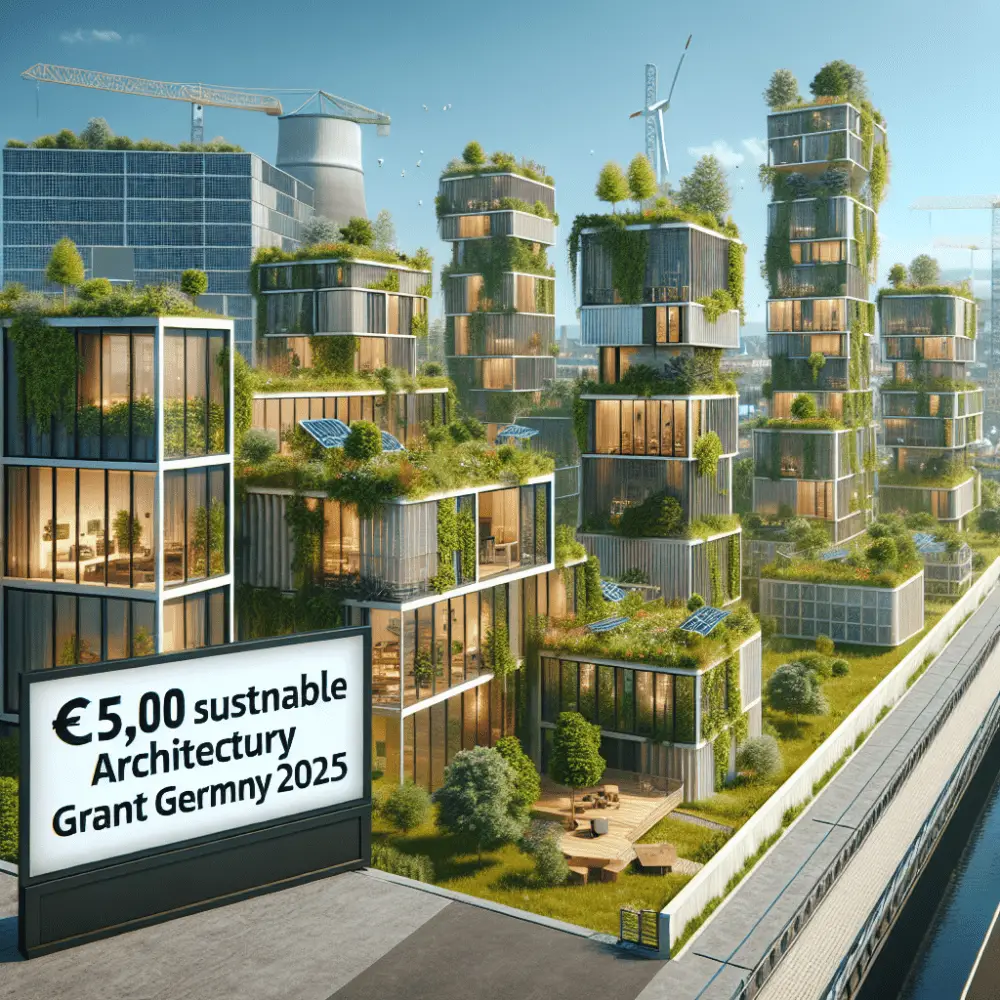Scholarship details
Germany, a country renowned for its engineering, innovation, and commitments to environmental sustainability, has introduced a new program designed to generate advances in eco-friendly construction practices. Announcing the €5,000 Sustainable Architecture Grant for the year 2025, Germany aims to encourage architects, designers, and innovators to develop architecture solutions that are environmentally friendly, energy-efficient, and foster sustainable living.
The Host Organization
The grant is provided by the Bundesministerium für Umwelt, Naturschutz und nukleare Sicherheit (BMU) or in English, the Federal Ministry for the Environment, Nature Conservation and Nuclear Safety. Established with the mission to ensure environmental protection and promote sustainable development, the BMU stands at the forefront of Germany’s ecological endeavors. The ministry works with national and international partners to address climate change, protect biodiversity, and advance environmental justice.
Through initiatives like the €5,000 Sustainable Architecture Grant, the BMU actively supports cutting-edge research and innovative projects with significant ecological impacts. This grant serves as a pinnacle effort in promoting sustainable architectural practices, understanding that buildings and urban planning hold substantial sway over our environmental footprint.
Germany: A Pioneer in Sustainability
Germany’s commitment to sustainability is rooted in its deep tradition of environmental consciousness and technological advancement. As one of the leading countries in the fight against climate change, Germany implemented the Energiewende (energy transition), a significant policy endeavor aimed at transforming its energy system to renewable energy sources.
The country’s landscape is dotted with vast wind farms, solar panels, and energy-efficient buildings that set global standards. Major cities like Berlin and Munich have pioneered green urban planning, prioritizing public transportation, green spaces, and energy-efficient housing. The nation’s dedication to a low-carbon future provides the perfect backdrop for an architectural grant seeking to achieve similar goals.
Germany’s robust education system and world-renowned research institutions also create fertile ground for innovations in sustainable architecture. Universities such as the Technical University of Munich and the University of Stuttgart are well-regarded for their programs in environmental science, engineering, and architecture. This educational excellence significantly supports the ambitions of the Sustainable Architecture Grant, creating a thriving environment for innovators to ideate and implement their projects.
Eligibility and Application Process
The €5,000 Sustainable Architecture Grant Germany 2025 is open to a wide range of applicants, including students, researchers, architects, and professionals in the field of sustainable architecture. Applicants must demonstrate how their project aligns with the principles of sustainability, focusing on aspects such as energy efficiency, use of renewable materials, and reducing the carbon footprint of buildings.
The application process involves a detailed proposal submission that outlines the project’s objectives, methodology, expected outcomes, and environmental impact. The proposal should demonstrate creativity and feasibility, reflecting innovative approaches to addressing contemporary environmental challenges.
A panel of experts from the BMU and affiliated institutions will review the applications. Successful candidates will be those who present projects with the potential to make significant contributions to sustainable architecture and environmental conservation.
Global Context and Comparisons
Germany’s initiative is part of a broader global movement to support sustainable practices through tailored grant programs. Just as the $5,000 Sustainable Architecture Grant Germany 2025 aims to foster innovation in eco-friendly construction, other countries have introduced similar efforts across different fields.
For example, the “Environmental Science Research Grant in New Zealand, 2024” is designed to support researchers focusing on environmental conservation and climate change mitigation. Similarly, Austria’s “$4500 Music Talents Development Fund, Austria 2024” aims to nurture musical innovation while integrating sustainable practices into the cultural landscape.
These international initiatives reflect a growing recognition of the need for targeted funding to address specific environmental challenges and promote sustainability across various sectors. They signify a commitment to fostering global collaboration and knowledge sharing to tackle the pressing issues of our time.
Impact and Future Prospects
The awards from the €5,000 Sustainable Architecture Grant Germany 2025 are expected to yield innovative projects that can serve as models of best practices in sustainable architecture. These projects will likely highlight the importance of integrating environmental considerations into architectural design, promote the use of sustainable materials, and demonstrate the benefits of energy-efficient buildings.
Participants will gain recognition and visibility for their work, paving the way for further opportunities in the field of sustainable architecture. The grant also catalyzes networking and collaboration, encouraging professionals to share knowledge and develop joint initiatives that can amplify their environmental impact.
Looking ahead, the BMU aims to expand the scope of the grant, potentially increasing the funding amount and including more categories to encompass a broader range of projects within sustainable architecture. There are plans to establish partnerships with international organizations to foster cross-border collaboration and exchange best practices globally.
Conclusion
The €5,000 Sustainable Architecture Grant Germany 2025 represents more than just financial support; it offers a platform for architects and innovators to pioneer new solutions for a sustainable future. By fostering creativity and supporting practical implementations, the BMU is contributing to a global effort to build a healthier, more sustainable world.
Germany’s example underscores the vital role of government initiatives in promoting environmental sustainability and innovation. The country’s commitment to green technology and sustainable practices makes it an ideal host for such a grant, setting standards for ecological consideration in architecture and beyond.
As the world moves towards a more sustainable future, initiatives like the €5,000 Sustainable Architecture Grant Germany 2025 will be crucial in nurturing the ideas and actions needed to create lasting, positive environmental changes.








